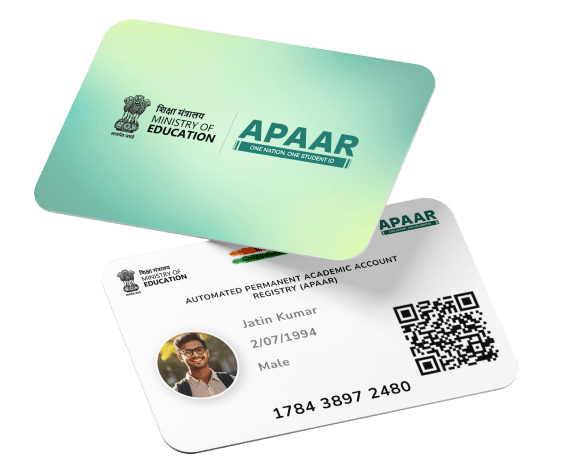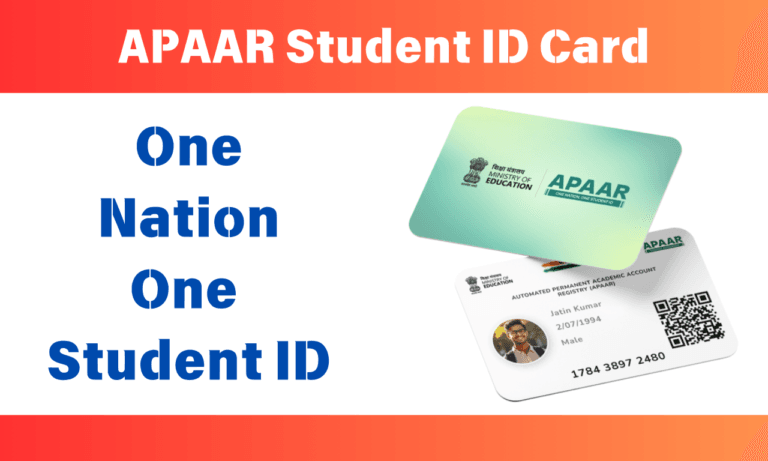Table of Contents
ToggleOverview of APAAR
The Automated Permanent Academic Account Registry (APAAR) is a pioneering initiative introduced by the Ministry of Education, India, on February 13, 2024. This program is designed to modernize the management and accessibility of academic records, ensuring a smoother educational experience for students throughout the country. APAAR aligns with the National Education Policy (NEP) 2020, which promotes digitization and individualized learning pathways in education.

Core Objectives of APAAR
The key goals of APAAR encompass:
- Establishing a Distinct Academic Identity: The program provides each student with a unique identification number to prevent duplication and inaccuracies in academic records.
- Promoting Student Mobility: APAAR enables students to transition between educational institutions with ease, avoiding complications associated with lost records.
- Enhancing Data Management: The initiative simplifies the upkeep of academic records, making it easier for institutions to maintain current and accurate information.
- Facilitating Lifelong Learning: By monitoring academic achievements and skills, APAAR supports students in their continuous learning journeys, fostering opportunities for skill enhancement.
Notable Features of APAAR
1. Detailed Academic Records
The APAAR ID acts as a digital credential for students, encompassing their complete academic journey. This includes:
- Grades and Performance Data: Safely stored records of all examinations undertaken.
- Certifications and Diplomas: Digital versions of significant academic documents.
- Extracurricular Accomplishments: Acknowledgment of participation in non-academic activities, ensuring a comprehensive record of student achievements.
2. Integration with DigiLocker
APAAR is linked to DigiLocker, a secure digital storage platform. This connection allows students to:
- Access their academic documents anytime and from any location.
- Easily share their credentials with educational institutions and employers, reducing the necessity for physical documents.
3. Centralized Management of Records
APAAR serves as a unified database for all student records, minimizing discrepancies and guaranteeing consistency. The system is integrated with the Unified District Information System for Education Plus (UDISE+), facilitating real-time updates and straightforward access to student data.
4. Credit Transfer Support
The initiative enables the seamless transfer of academic credits among institutions, enhancing flexibility in education. This is particularly advantageous for students who may relocate or change their educational focus.
5. Robust Data Security
APAAR implements strong data protection measures to ensure the security of students’ personal information. Features include:
- Advanced Encryption: Cutting-edge encryption methods safeguard sensitive data from unauthorized access.
- Consent Protocol: Parental or guardian consent is required for data sharing, ensuring adherence to legal standards.
Implementation Plan
1. Initial Deployment
The rollout of APAAR includes several crucial steps:
- Parent-Teacher Meetings (PTMs): Schools are encouraged to hold PTMs to inform parents about the APAAR initiative and gather consent for ID generation.
- Verification Process: Institutions will authenticate students’ demographic details through UDISE+.
2. Importance of Parental Consent
For students under 18, securing parental consent is essential. Schools must ensure that:
- A legally approved multilingual consent form is given to parents.
- Consent is documented and maintained securely by school authorities.
3. Ongoing Assistance
To support schools and parents, a dedicated helpline (1800-889-3511) is available for inquiries related to the APAAR ID generation process, ensuring a seamless experience for all involved.
Advantages of APAAR
1. Enabling Student Mobility
A significant benefit of APAAR is its ability to promote student mobility. In today’s educational landscape, students often transfer schools for various reasons. With APAAR, they can:
- Keep their academic records intact without the risk of losing vital documents.
- Transition smoothly between educational institutions, enriching their academic experience.
2. Improved Data Precision and Consistency
APAAR tackles the challenges of data discrepancies in student records. By centralizing academic data, the program guarantees that:
- Records are accurate and regularly updated, benefiting students and educational institutions alike.
- Students’ academic histories are consolidated, simplifying record management for parents, educators, and institutions.
3. Enhanced Policy Development and Resource Distribution
The data collected through APAAR will be shared with various stakeholders, enabling informed decision-making regarding educational policies and resource allocation. This will aid in:
- More effective interventions to bring Out of School Children (OoSC) back into the education system.
- Ensuring compliance with the Right to Education (RTE) Act, mandating free and compulsory education for children.
4. Support for Continuous Learning
APAAR extends beyond academic records by supporting lifelong learning through:
- Monitoring students’ academic progress over time, which allows for personalized study plans.
- Offering insights for skill gap analysis, ensuring students can engage in relevant upskilling programs.
Clarifying Common Misunderstandings
As with any new initiative, misconceptions may arise around APAAR. It is crucial to clarify these to foster acceptance:
- Misconception: APAAR is only for prestigious institutions.
- Reality: APAAR is designed for all students in India, regardless of the type of institution they attend.
- Misconception: Concerns about data security.
- Reality: All APAAR-related information is securely stored and transmitted via authorized government databases, adhering to data protection regulations.
- Misconception: Participation in APAAR is mandatory.
- Reality: While APAAR is a valuable resource for students and institutions, it is not compulsory.
Conclusion
The APAAR initiative signifies a transformative shift towards a more efficient, inclusive, and transparent educational framework in India. By providing students with a unique academic identity, APAAR simplifies the management of educational records and promotes a culture of lifelong learning. As the program continues to expand, it is well-positioned to revolutionize the educational landscape, making education more accessible and manageable for millions of students nationwide.
For more details about APAAR and its implementation, please visit the official website: APAAR.



